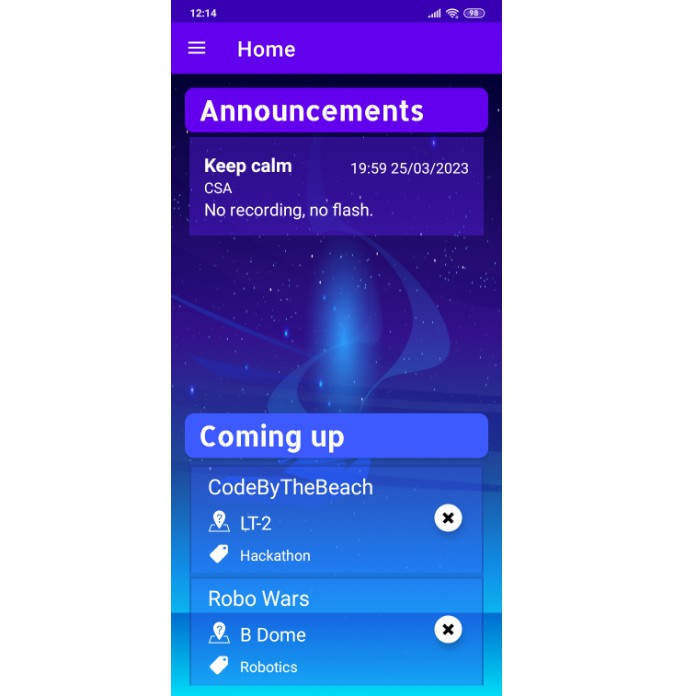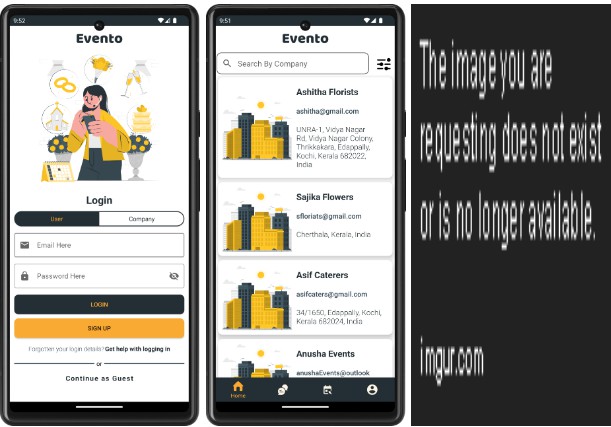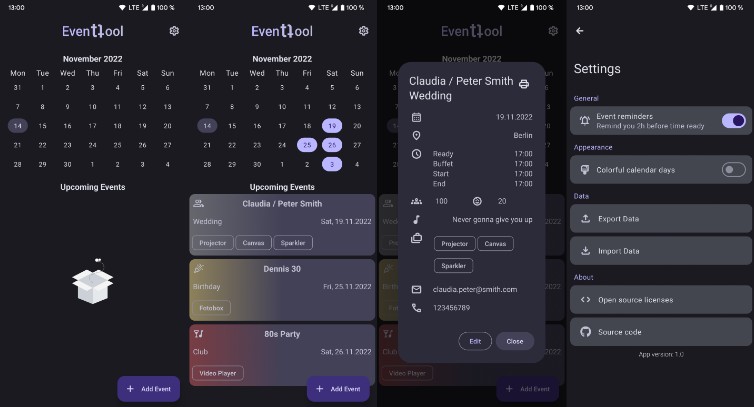EventFlow: Topic based event bus for Android 
EventFlow provides coroutine based event bus, especially focused on effective management of multiple event streams. To achieve this EventFlow implements MQTT style topic management.
EventFlow uses Kotlin, Coroutine and SharedFlow for the event bus core. Check another event bus library using reactive stream. Godstale’s EventPress.
Feature list
- Manage multiple event streams with topic hierarchy like MQTT protocol does.
- Each event stream you make has it’s own topic path like “/viewmodel/logic/stream1”
- Supports “make”, “observe” or “publish” actions on a topic and it affects target topic and descendants.
- EventFlow provides APIs for the backpressure strategy and valve control.
- it’s very lightweight
Gradle settings (via JitPack.io)
- In your project level build.gradle:
allprojects {
repositories {
...
maven { url "https://jitpack.io" }
}
}
- Add the dependency at module level
build.gradle: curret latest version is 1.0.1
dependencies {
implementation 'com.github.godstale:EventFlow:<LATEST-VERSION>'
}
How to use
Content
- Topic
- Test code
- Simple usage
- Basic usage
- Publish an event
- Remove topics
- Builder test
- Error control
- Finally
Topic
Topic is the hierarchical expression of each event stream which uses ‘/’ as divider like path of file system. For example:
- /api
- /api/member
- /api/member/login
- /api/member/info
If you made topic hierarchy like example, publishing an event on the topic /api/member delivers event to /api/member, /api/member/logic and /api/member/info also.
You can name each event stream as you wish. But you have to follow below rules.
- Topic string must starts with ‘/’
- Topic string should not end with ‘/’
- Do not use root ‘/’ expression at API call
- No blank is allowed
- Only [ . _ 0-9 a-z A-Z / – ] is allowed
- Max length is 256
- each topic name has one or more characters.
- /sys, /sys/class, /sys/ui and /sys/common is reserved. Do not use these topics on API call.
- Doesn’t support wild card character.
Test code
Check out the MainActivity, there are test codes to check out basic usage of EventFlow.
Simple usage
Before calling the EventFlow APIs, initialize EventFlow first. (Application class is good to do this) :
EventFlow.initialize()
Most simpe way to observe and publish events. :
EventFlow.subscribe<String>(lifecycleScope, {
showLog(" -->[/sys/common] event received = $it")
}, {
showLog(" -->[/sys/common] exception = ${it.localizedMessage}")
})
showLog("[/sys/common] Publish message")
EventFlow.publish("Hello world!!")
No topic definition is found in this example but EventFlow core uses common topic, /sys/common as default.
Very easy to use but keep in mind that all the observer on this topic uses same object type over the application. (See the type casting of String)
Basic usage
Observe and publish events on custom topic. :
val TOPIC_TEST_BASIC = "/test/basic"
// create a topic
EventFlow.builder()
.setTopic(TOPIC_TEST_BASIC)
.build()
// subscribe a topic twice
val subscriberJob1 = EventFlow.subscribe<String>(TOPIC_TEST_BASIC, lifecycleScope) {
showLog(" -->[$TOPIC_TEST_BASIC, #1] $it")
}
val subscriberJob2 = EventFlow.subscribe<String>(TOPIC_TEST_BASIC, lifecycleScope) {
showLog(" -->[$TOPIC_TEST_BASIC, #2] $it")
}
lifecycleScope.launch {
delay(100)
// publish data to a specified topic
EventFlow.publish(TOPIC_TEST_BASIC, "Hello world!!", false)
delay(100)
// unsubscribe topic
subscriberJob1?.cancel()
// publish data again
EventFlow.publish(TOPIC_TEST_BASIC, "Hello world!! - 2", false)
}
You can make a topic, event stream, with EventFlowBuilder. But without builder code, you can receive events by calling EventFlow.subscribe<>(). Because EventFlow makes topic automatically if it’s not exist.
EventFlow.subscribe<>() attach your lambda function to Coroutine SharedFlow event stream.(internally calls SharedFlow.collect(your_lambda())) And subscribe() function returns coroutine Job instance. You can cancel subscription and release resources with Job.cancel().
Keep in mind that you have to release resources after use. Job.cancel() removes single subscription. EventFlow.remove(topic) closes topic and all subscribers.
Publish an event
Publish an event to topics. :
val TOPIC_TEST_PUBLISH = "/test/pub"
val TOPIC_TEST_PUBLISH1 = "/test/pub/depth1"
val TOPIC_TEST_PUBLISH2A = "/test/pub/depth1/depth2a"
val TOPIC_TEST_PUBLISH2B = "/test/pub/depth1/depth2b"
// subscribe() makes a topic [/test/pub] if it doesn't exist
EventFlow.subscribe<String>(TOPIC_TEST_PUBLISH, lifecycleScope) {
showLog(" -->[$TOPIC_TEST_PUBLISH, #1] $it")
}
// create a topic [/test/pub/depth1] and subscribe
EventFlow.subscribe<String>(TOPIC_TEST_PUBLISH1, lifecycleScope) {
showLog(" -->[$TOPIC_TEST_PUBLISH1] $it")
}
// create a topic [/test/pub/depth1/depth2a] and subscribe
EventFlow.subscribe<String>(TOPIC_TEST_PUBLISH2A, lifecycleScope) {
showLog(" -->[$TOPIC_TEST_PUBLISH2A] $it")
}
// create a topic [/test/pub/depth1/depth2b] and subscribe
EventFlow.subscribe<String>(TOPIC_TEST_PUBLISH2B, lifecycleScope) {
showLog(" -->[$TOPIC_TEST_PUBLISH2B] $it")
}
lifecycleScope.launch {
delay(100)
showLog("[$TOPIC_TEST_PUBLISH] Publish message (to single topic)")
EventFlow.publish(TOPIC_TEST_PUBLISH, "Hello world!! 1", false)
delay(100)
showLog(" ")
showLog("[$TOPIC_TEST_PUBLISH] Publish message (recursive to descendants)")
EventFlow.publish(TOPIC_TEST_PUBLISH, "Hello world!! 2")
}
recursive = false parameter targets only one topic.
Remove topics
Test to remove a topic and descendants :
val TOPIC_TEST_REMOVE = "/test/pub"
val TOPIC_TEST_REMOVE1 = "/test/pub/depth1"
val TOPIC_TEST_REMOVE2A = "/test/pub/depth1/depth2a"
val TOPIC_TEST_REMOVE2B = "/test/pub/depth1/depth2b"
// create a topic [/test/pub] and subscribe
EventFlow.subscribe<String>(TOPIC_TEST_REMOVE, lifecycleScope) {
showLog(" -->[$TOPIC_TEST_REMOVE] $it")
}
// create topic [/test/pub/depth1] and subscribe
EventFlow.subscribe<String>(TOPIC_TEST_REMOVE1, lifecycleScope) {
showLog(" -->[$TOPIC_TEST_REMOVE1] $it")
}
// create topic [/test/pub/depth1/depth2a] and subscribe
EventFlow.subscribe<String>(TOPIC_TEST_REMOVE2A, lifecycleScope) {
showLog(" -->[$TOPIC_TEST_REMOVE2A] $it")
}
// create topic [/test/pub/depth1/depth2b] and subscribe
EventFlow.subscribe<String>(TOPIC_TEST_REMOVE2B, lifecycleScope) {
showLog(" -->[$TOPIC_TEST_REMOVE2B] $it")
}
lifecycleScope.launch {
delay(100)
// Publish a message
showLog("[$TOPIC_TEST_REMOVE] Publish message (Recursive)")
EventFlow.publish(TOPIC_TEST_REMOVE, "Hello world!! - 1")
delay(100)
// Remove a topic
showLog("[$TOPIC_TEST_REMOVE2B] Remove a topic")
EventFlow.remove(TOPIC_TEST_REMOVE2B)
delay(100)
// Publish a message
showLog("[$TOPIC_TEST_REMOVE] Publish message (Recursive)")
EventFlow.publish(TOPIC_TEST_REMOVE, "Hello world!! - 2")
delay(100)
// Remove top level topic and descendants
showLog("[$TOPIC_TEST_REMOVE] Remove topics")
EventFlow.remove(TOPIC_TEST_REMOVE)
delay(100)
// Publish a message but there's no subscriber.
showLog("[$TOPIC_TEST_REMOVE] Publish message (Recursive)")
EventFlow.publish(TOPIC_TEST_REMOVE, "Hello world!! - 3")
}
Always EventFlow.remove() deletes target topic and descendants.
Builder test
How to use builder to apply options to the topic :
// create a topic using canonical name of class
EventFlow.builder()
.setTopic(MainActivity::class.java)
.setBufferSize(32)
.withBackpressure(EventFlowControl.BpType.DROP_OLDEST)
.withValve()
.build()
// subscribe a topic twice
EventFlow.subscribe<String>(MainActivity::class.java, lifecycleScope) {
showLog(" -->[Subscriber #1] $it")
}
EventFlow.subscribe<String>(MainActivity::class.java, lifecycleScope) {
showLog(" -->[Subscriber #2] $it")
}
lifecycleScope.launch {
delay(100)
// Publish a message
showLog("[MainActivity] Publish a message")
EventFlow.publish(MainActivity::class.java, "Hello world!! - 1")
// Switch valve
delay(100)
showLog("")
showLog(" -->[Topic : MainActivity] close valve")
EventFlow.switchTopicValve(MainActivity::class.java, open = false)
// Publish a message
delay(100)
showLog("")
showLog("[MainActivity] Publish a message")
EventFlow.publish(MainActivity::class.java, "Hello world!! - 2")
// Switch valve
delay(100)
showLog("")
showLog(" -->[Topic : MainActivity] open valve")
EventFlow.switchTopicValve(MainActivity::class.java, open = true)
// Publish a message
delay(100)
showLog("")
showLog("[MainActivity] Publish a message")
EventFlow.publish(MainActivity::class.java, "Hello world!! - 3")
}
Add .withValve() in builder method chain and call EventFlow.switchTopicValve() to switch on and off the stream. (It affects every topic subscriber)
Set buffer size with .setBufferSize() method. Default is 64.
Add back pressure policy with .withBackpressure(). You can select one of three types – EventFlowControl.BpType.SUSPEND, EventFlowControl.BpType.DROP_OLDEST and EventFlowControl.BpType.DROP_LATEST. DROP_OLDEST is default.
Error control
// subscribe a topic
EventFlow.subscribe<Int>(MainActivity::class.java,
lifecycleScope,
// Set callback
{
showLog(" -->[Subscriber #1] integer = $it")
},
// Set error handler
{
showLog("")
it.localizedMessage?.let { it1 -> showLog(it1) }
})
lifecycleScope.launch {
delay(100)
// Publish a message. This event makes below exception.
// java.lang.String cannot be cast to java.lang.Number
showLog("[MainActivity] Publish a message")
EventFlow.publish(MainActivity::class.java, "Hello world!!")
}
In this example I subscribed topic with Int type but published an event with String object. To catch unexpected errors like this example, add error handler when you subscribe a topic.
Finally
EventFlow.subscribe<>() returns coroutine Job instance.
Do not forget calling Job.cancel() after use. Subscribers keep alive until user removes the topic. Especially subscribers on system reserved topic(/sys/xxx) lasts until user terminates the app if you don’t dispose it.
.
.


